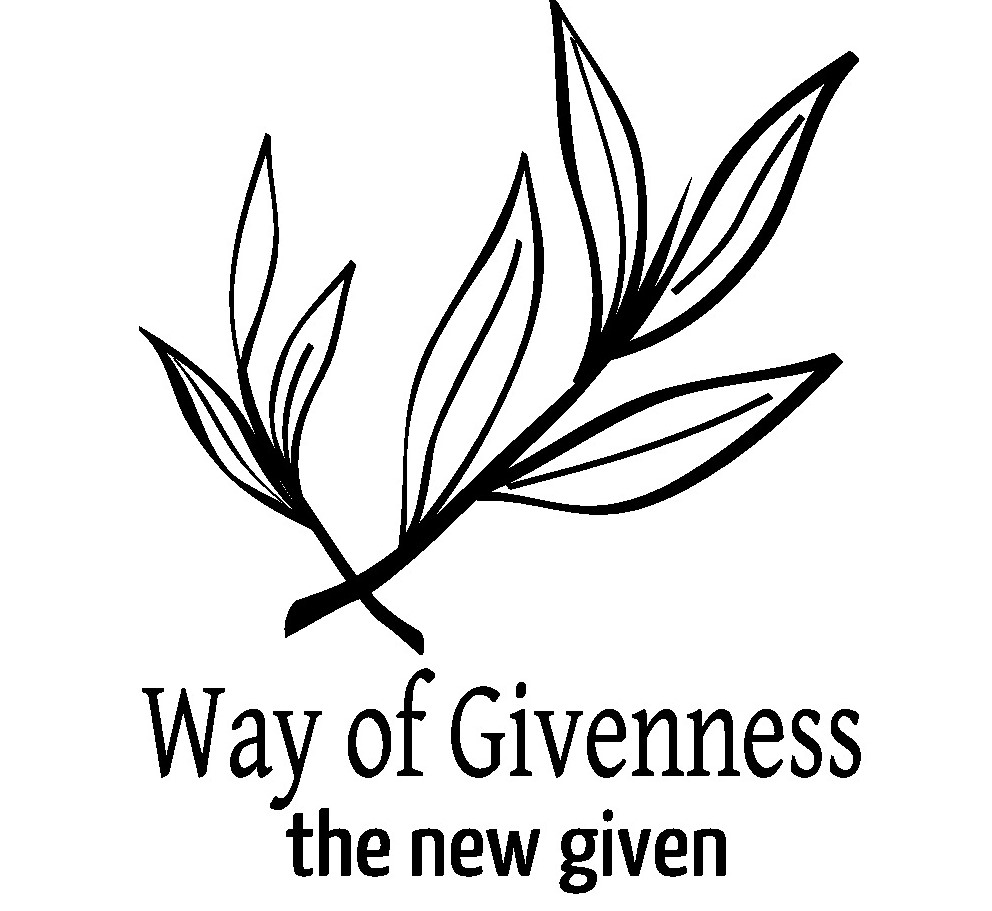- Home
- Daily Meditation
Golden Season in Life

Synopsis 1Kings 4:20-5:11 3/7/2019
Israel and Judah thrived under Solomon. The king had consolidated the power of the nation. And he used it to influence and control the nations around Israel.
Everywhere there was peace. And the kingdom grew to its greatest size. In fact, King Solomon’s court was magnificently large and attracted the attention of all nations around it. And the abundance of the court was a reflection of the abundance of the land.
On top of all of this, God gave King Solomon this extraordinary wisdom. And with that, anything seemed possible for Israel.
The Beginning of a Golden Age in Israel
King Solomon’s reign was the beginning of a golden age for the nation of Israel. Like the first flowering of a fruit tree, the Israelites viewed the abundance as the fulfillment of God’s promises to Israel. And they tended to view Solomon as the leader who ushered in God’s golden age.
A Golden Season in Life
A fruit tree has different seasons. For example, there is a season for quiet growth. And then, there are seasons flowering. And these comes the fruit. Generally, every season of fruitfulness is followed by a season of quiet before the cycle repeats.
It will not be different for me. So, I can expect to experience seasons when God’s goodness feels like a flowering in my life. And I can also anticipate times of incredible productivity. But I can also expect to have days when nothing seems to be happening.
This is normal. Yet, very often in such times, I’m tempted to wonder if I’ve been forgotten. Or, I’ll wonder if I’ve somehow missed out on God’s best for my life.
Not so. You are exactly where God intends you to be. And so, maybe I’m the guy lying on a mat waiting to be healed. Or, maybe I’m the person for whom nothing ever seems to go wrong. The important and actionable truth is to simply respond to my circumstances with love for the God of all Creation, and with loving-kindness for my neighbor – whoever that may be.
“I know indeed how to live in humble circumstances; I know also how to live with abundance. In every circumstance and in all things I have learned the secret of being well fed and of going hungry, of living in abundance and of being in need.I have the strength for everything through him who empowers me.” Phil 4:12
With the Wise Surround
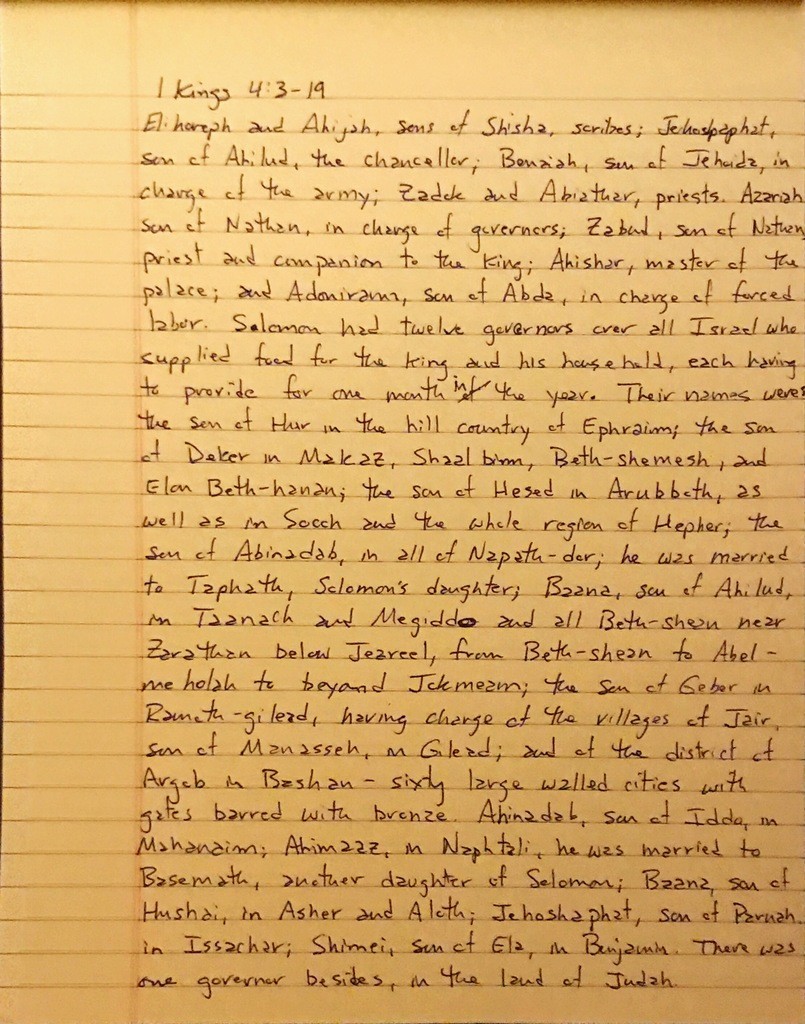
Synopsis 1Kings 4:3-19 3/6/2019
In the early part of his reign, Solomon retained many key administrators from King David’s court. These included Zadok, the high priest. Also, Benaiah, who was one of King David’s “Thirty” and who led the army for King Solomon.
Yet, Solomon seems to have reorganized certain political divisions within the nation. He used governors to tax the various regions. And he used the tax to support the central government in Jerusalem. Some of these regions were closely associated with particular tribes. But some of the regions seemed to cross traditional tribal boundaries.
The Experienced Court of Solomon
Solomon kept much of King David’s leadership intact. He recognized the value of allowing experienced leaders and administrators do their work.
And in this sense, Solomon demonstrated remarkable leadership. He rejoiced in the gifts and abilities of others. Accordingly, he engaged with skilled workers and honored those who had achieved great accomplishments in life.
With the Wise Surround
I have the tendency to think that I understand more than I actually do. And this has sometimes resulted in my reluctance to seek out the wisdom of others. Despite knowing people who have gained insight through years of experience, my pride prevents me. Pride powers my ignorance.
Yet, when I realized that wisdom is often the exclusive result of long-experience, I’m forced to make a decision. So, I have to decide if preserving my pride is worth the pain of having to rediscover lessons that more experienced people would gladly teach me.
So, consider actively seeking wisdom. Find a way. Find a spiritual director. Gather with others to study the scripture or the tradition. Engage the elders in your faith community.
“Presbyters who preside well deserve double honor, especially those who toil in preaching and teaching.” 1Tim 5:17
Compassionate Love
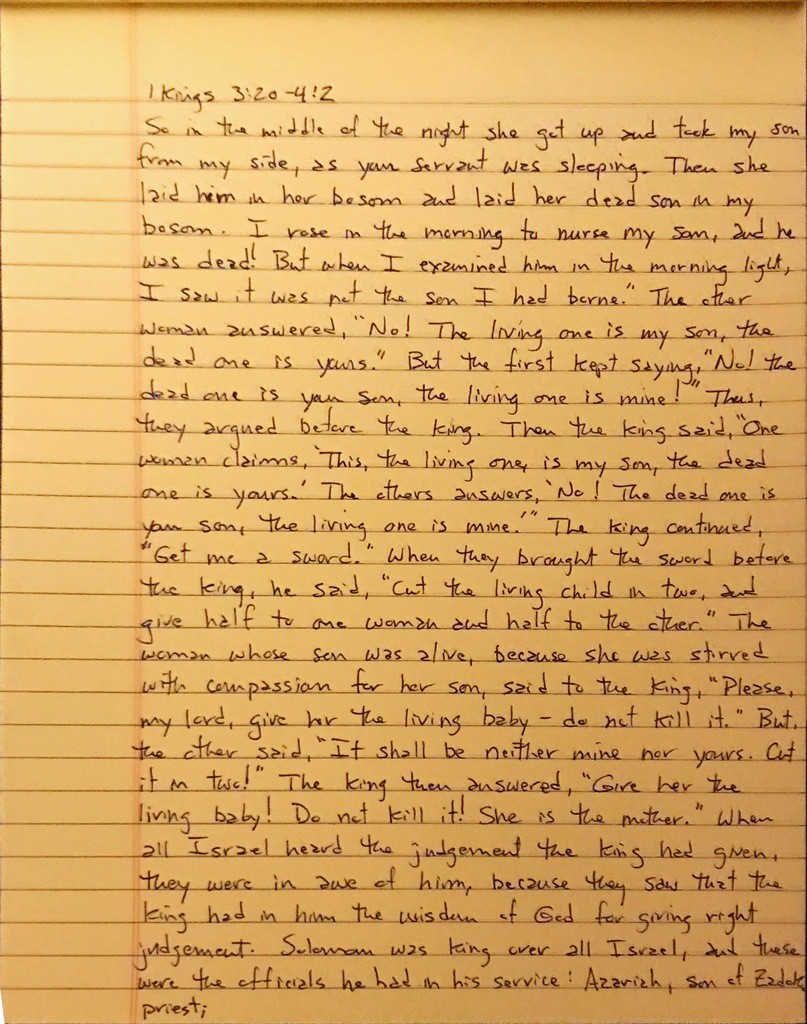
Synopsis 1Kings 3:20-4:2 3/5/2019
There were two women who lived together. Both women were prostitutes. And both had recently borne baby boys. One woman’s infant son died in the night. She had inadvertently smothered the child. But when she realized what happened, she switched her dead child with the other woman’s living son.
A dispute broke out between the women. And there was no one who could resolve the dispute. So, the women brought the case before King Solomon.
The king heard the two women’s competing claims. Then he asked for a sword, with the intention of cutting the child into two pieces and giving each woman half the child.
The king’s proposal to slay the child mortified the true biological mother. And so, she relinquished her claims. However, the other women agreed with the king’s proposal that it would be better for neither of the women to have the child.
With this ruse, the king discerned the true biological mother. And so, he reunited the woman and her child.
Solomon and the Prostitutes
The curiosity of this scene isn’t just the bizarre circumstances. And it isn’t just King Solomon’s profoundly wise process of discernment. The strangeness of this scene begins with the idea of two prostitutes standing before the king seeking judgement.
Prostitution wasn’t within the law. And although it seems to have had a tacitly accepted place in ancient Israelite culture, it wasn’t a proper industry. So, in a certain way, it was like two thieves going before a judge with a dispute about the ownership of stolen property.
The implication is that neither of these women were of good reputation.
And yet, they loved.
Solomon knew this. He understood a mother’s love. And he used the essence of love to identify the true mother of love.
And so, he proved that the love of a mother for her child was the same.
Compassionate Love
So, the one who loves is the true mother….
“For whoever does the will of my heavenly Father is my brother, and sister, and mother.” Matthew 12:50
Wisdom, Materials, Blessings
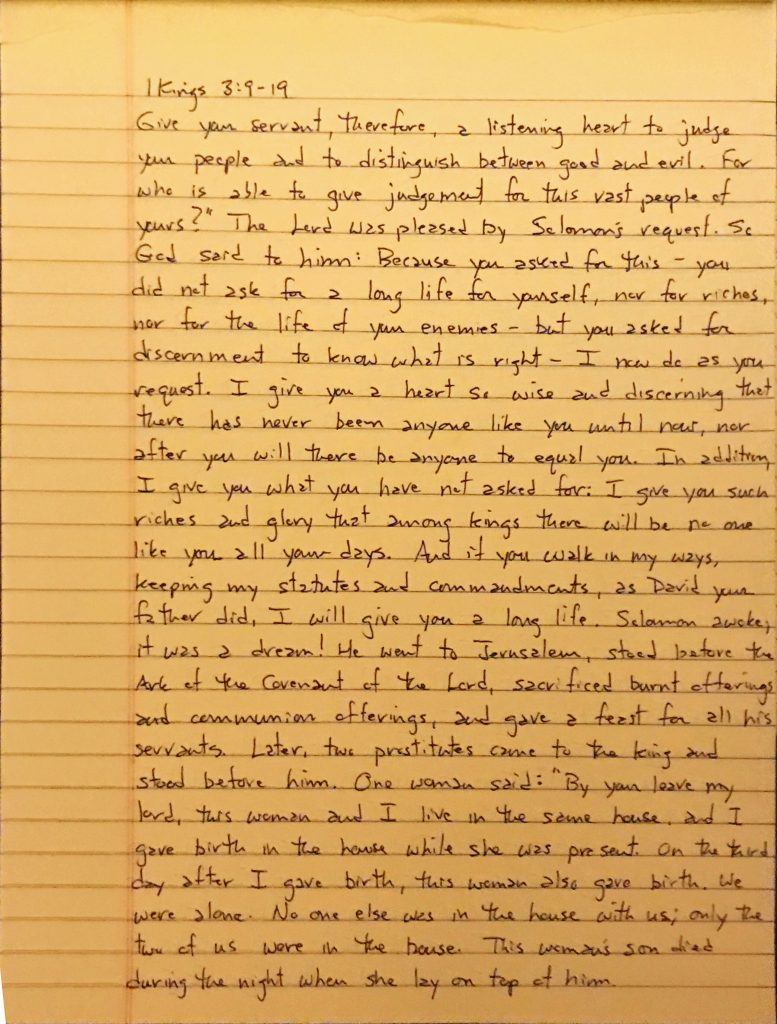
Synopsis 1 Kings 3:9-19 3/4/2019
Solomon received wisdom from the Lord. But, God gave him wisdom because he recognized that he needed clear insight in order to lead the nation.
And, because he valued wisdom above every other thing, God also gave him other material blessings. These included wealth, power and a long life.
So, Solomon returned to Jerusalem. And once there, he went to the tent of meeting. And he offered sacrifices. In addition, he celebrated by giving a feast for all his servants.
Solomon’s Wisdom and Blessings
Solomon received wisdom because he needed it to rule effectively. But as he made wise decisions, other kinds of blessings seemed to naturally flow into his life.
Wisdom, Materials, and Blessings
Wisdom is a peculiar blessing because the effective use of every other kind of blessing requires wisdom. So, wisdom has a multiplying effect. Instead of simply consuming material blessings, there is tendency to make them grow.
God has promised that if I seek for wisdom, then it will be found. And, of course, this promise is not unique to Solomon, or to any specific person. God has promised wisdom to anyone who seeks it.
So, let’s ask God for wisdom. And in that way, we might more fully enter into the possibility of our lives.
“Long life is in her right hand, in her left are riches and honor;” Prov 3:16
Knowing and Needing
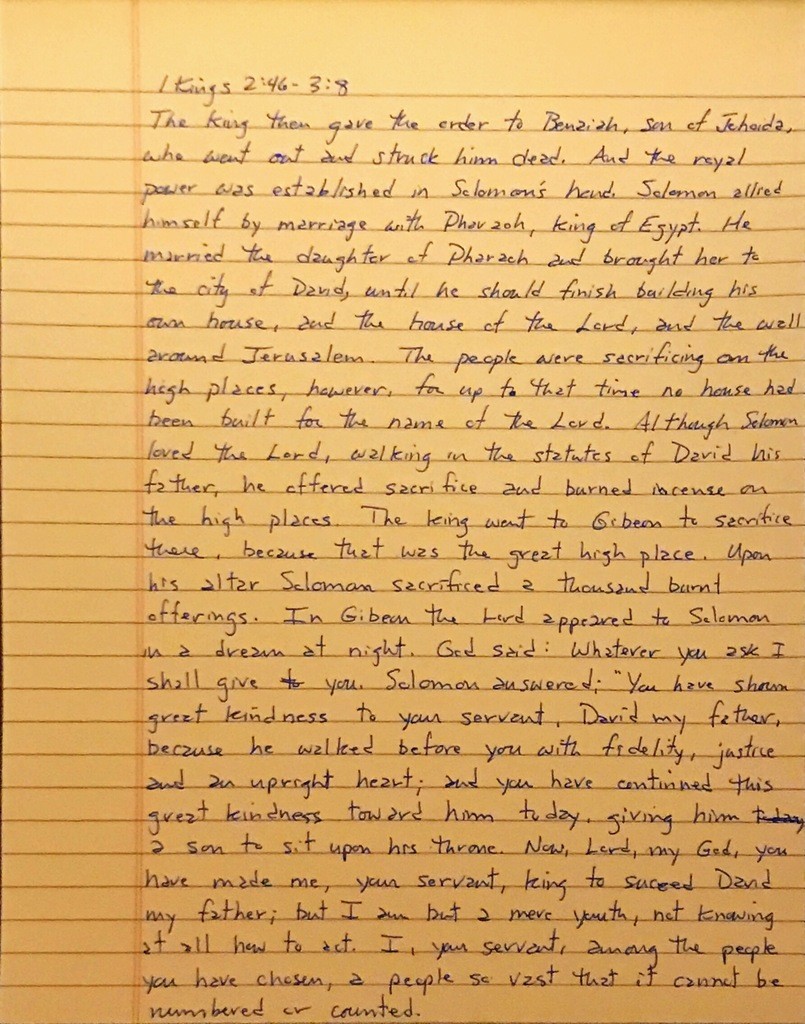
Synopsis 1Kings 2:46-3:8 3/1/2019
Solomon made an alliance through marriage with Pharaoh, King of Egypt. He married Pharaoh’s daughter. And she lived in Jerusalem with him.
The people were sacrificing on the high places throughout Israel. And even Solomon offered sacrifices on the high places of Gibeon. In fact, it was there that the Lord appeared to Solomon. It was in a dream. And, the Lord offered to give Solomon whatever he asked.
So, Solomon responded by acknowledging his youthful inexperience. And accordingly, he asked God for the wisdom necessary to rule the people well
Solomon Knew What He Needed
Solomon was a young man. And young men often suffer from the delusion that they know more than they actually do. There are many reasons for this. But perhaps the greatest is the pressure they feel to be a grown-up man. They feel the need to appear self-sufficient in the eyes of the community.
But Solomon recognized in himself a certain lack that he, by himself, could not fill. And, in addition, he was suddenly thrust into the kingship. So, he quickly realized that he needed wisdom if he was going to keep the fledgling kingdom of Israel together.
Knowing and Needing
The Way of Knowing is a middle way between the extremes of either utter ignorance on the one hand, or presumptive arrogance, on the other. I can simply lack the life experience to be able to understand and interpret my circumstances. That is simple ignorance. Naivety.
But I can also think that I understand when in reality I don’t. I can stake my claim as an armchair quarterback, knowing everything and yet knowing nothing. That is presumptive, ignorance.
But when I really need an answer then I’ll quit my presumption. Or, when I really need an answer, I’ll no longer be satisfied with my naive ignorance.
In that moment, my obvious need for wisdom will trump everything else. And like Solomon, I’ll cry out to the fount of all wisdom. And I won’t be disappointed.
“It is the glory of God to conceal a matter, and the glory of kings to fathom a matter.” Prov 25:2
Cast Out the Mocker

Synopsis 1Kings 2:35-45 2/28/2019
Solomon summoned Shimei the Benjamite to Jerusalem. Shimei had abused King David when he was fleeing Jerusalem during Absalom’s rebellion.
So, Solomon commanded Shimei to build a house and remain in Jerusalem. Shimei was allowed to live in peace as long as he did not depart from the city.
And Shimei agreed. But after three years, two of Shimei’s servants ran away to Gath. And so, Shimei pursued them. He apprehended the servants and forced them to return with him to Jerusalem.
Not long afterward, Solomon heard that Shimei had departed the city and then returned. And so, he once again summoned Shimei. But this time Solomon condemned him to death for his disobedience. And then, Shimei was slain.
Death of Shimei
After Absalom’s rebellion had failed, King David returned to Jerusalem. It was a time of great tensions between many of the tribes. And so, David was keen to heal the breeches between various tribal rivalries. As a result, he spared Shimei and others who had sided with Absalom.
But the problem of Shimei remained. He was a mocker who had deliberately offended the king of God’s chosen people. He was a threat to the success of the community. For, not fearing the king was commensurate with not fearing God. And not fearing God would be the end of Israel.
Cast Out the Mocker
This is hard because, too often, I am Shimei. I am prone to arrogance. And my inclination to arrogance causes turmoil in the organizations and communities where I live and work.
This self-revealing truth forces me to make a decision: Will I put down my pride for the benefit of the people around me. And, if I do, then my life expands exponentially.
But if I can’t, then everything I’ve ever said that I wanted for myself and others will collapse onto itself. And my life will become unimaginably small.
“Expel the arrogant and discord goes too; strife and insult cease.” Prov 22:10
Death of Joab

Synopsis 1Kings 2:27-34 2/27/2019
Solomon ordered Adonijah to be struck down for conspiracy. Along with this, he exiled Abiathar the high priest. Finally, Solomon ordered Benaiah to strike down Joab.
But Joab went to the Tent of Meeting and grabbed onto the horns of the altar. As such, he refused to come out of the tabernacle when Benaiah commanded him. So, Benaiah conferred with King Solomon. And Solomon directed Benaiah to strike Joab there, before the altar.
And so, Joab died and was buried.
Death of Joab
Joab is one of the most enigmatic characters in all of scripture.
Joab uncharacteristically stymied David. It almost seems like David simply didn’t know what to do with him. David was a wise king. And, he was a fearless warrior. And he was also a remarkably faithful man.
Yet, David struggled with Joab. In fact, Joab was the one person that David could never seem to bring under control.
And yet, to his credit, Joab was strangely faithful to David. He fought with David and the army of Israel during the reign of King Saul. And, he followed David into the wilderness when David was exiled by Saul. What’s more, he deferred to David and didn’t kill Saul in the cave. Not to mention that he led David’s army for forty years.
And Joab supported David even when he knew the King was wrong. For example, he conspired to have Uriah the Hittite killed. And he performed an ill-advised census even after warning the king that it was a bad idea.
Still, David perceived Joab as a loose cannon. And he feared that Solomon would not have the liberty to reign freely as long as Joab was alive. And so, for the good of the kingdom, and in justice, he directed Solomon to execute Joab after his own death.
The Enigma of Joab
I do not understand how to interpret Joab.
Yet, curiously the phenomena of Joab is more than this individual person. Throughout scripture, and in the experience of my own life, I have encountered great leaders who have someone like Joab. A person that seems to be both indispensable and yet barely tolerated.
“Do not withhold discipline from youths; if you beat them with the rod, they will not die. Beat them with the rod, and you will save them from Sheol.” Prov 23:13-14
Person of Action

Synopsis 1Kings 2:19-26 2/26/2019
Adonijah went to Bathsheba and professed his love for Abishag. He enlisted her help in asking his brother, King Solomon, to allow the marriage.
However, when she made the request, Solomon saw through the seemingly innocent petition. He recognized that marrying Abishag would strengthen Adonijah’s claim to the throne if anything happened to Solomon. It also made it clear that Adonijah had not relinquished his hopes to one day rule Israel.
Solomon acted swiftly. He sent Benaiah with the command to strike down Adonijah. Immediately after, he commanded Abiathar, the High Priest, to return to his home estate and never return to Jerusalem again. He only spared Abiathar because he had endured the days of suffering during King David’s early years.
With this, he had dealt with two of the three main conspirators in Adonijah’s attempt to take the throne.
Solomon was a Man of Action
Solomon had made a disingenuous request through Bathsheba. Though she failed to apprehend his true motive, Solomon did.
And once Adonijah revealed his motive, Solomon took the appropriate action. And his acts were swift and decisive.
Person of Action
Rightly done, acting is a mean between the extremes of either the coward or the cavalier. It is action that is informed with knowledge and an appropriate response to the value – or disvalue – at hand.
Ascertaining the “what” of what’s happening isn’t enough for faithful Christian response. Even rightly recognizing the essential value of a particular set of circumstances doesn’t rise to the level of moral righteousness.
What reveals “God in me” is action. Action is the testimony of my life.
“Be doers of the word and not hearers only, deluding yourselves.” James 1:22
The Generous Impulse

Synopsis 1Kings 2:8-18 2/25/2019
King David was dying. So, he gave his last bits of counsel to Solomon. Among these was a reminder of how Shimei had abused the king during Absalom’s rebellion.
And then, David died.
After his death, Adonijah went to Bathsheba. He wanted to marry Abishag, the Shunamite woman who served as King David’s nurse. So, he asked Bathsheba to make this request of Solomon. This seemed innocent enough to Bathsheba. So, she agreed.
Bathsheba’s Generous Impulse
Abishag was King David’s nurse until the time he died. It’s important to remember that she had been selected for this job because of her beauty and faithfulness. So, Adonijah’s innocent attraction to a worthy woman was understandable. And, in this way, it was not surprising that Adonijah would want to marry her.
And Bathsheba was a woman who well understood the nature of desire between a man and a woman. So, the request was plausible and seemed innocent enough. But in fact, it wasn’t innocent. And her inability to identify Adonijah’s true motive caused her to agree to help someone who intended to harm her own son.
The Generous Impulse
Ultimate success in life means learning to interpret circumstances and act appropriately. It means, learning to experience and respond to value in the way that God experiences and responds to value.
Relationship wisdom begins by gaining insight into what motivates a person’s behavior, and then acting in harmony with God’s purpose.
“As for you, Solomon, my son, know the God of your father and serve him with a whole heart and a willing soul, for the LORD searches all hearts and understands all the mind’s thoughts. If you search for him, he will be found; but if you abandon him, he will cast you off forever” 1Chron 28:9
Way of Mercy

Synopsis 1King 1:57-2:7 2/22/2019
Adonijah was King David’s oldest surviving son. In his father’s old age and infirmity, Adonijah had assumed the throne with the help of other religious and political leaders. However, King David named Solomon his successor. And this caused Adonijah to seek refuge at the Tent of Meeting for fear of Solomon. He clung to the alter in hope that Solomon, his half-brother, would grant him mercy.
And Solomon did grant him mercy. So, Adonijah came to Solomon as he sat on the throne. And there, he bowed down to Solomon. This was a symbolic way for the community to recognize that Adonijah accepted Solomon’s authority as ruler of the land.
Not long after, David became aware that he was dying. So, he called Solomon to meet with him. And he gave him three instructions that he intended Solomon to carry out after his death. The first was to remain faithful to the Law of Moses. The second was to take vengeance on Joab for killing two of David’s generals. And the third was to remain faithful in blessing the sons of Barzillai – the man who had funded David’s defense against Absalom’s rebellion.
Solomon’s Mercy
Solomon was free to forgive Adonijah. And he was free to relieve Adonijah’s anxiety. Perhaps this was partly out of deference to David, his father, who would have wanted peace between brothers.
But Solomon’s mercy was also an indication that he felt secure in his place. Because of this, he did not feel the need to react to Adonijah out of fear. And so, Solomon was free to make a wise and merciful decision.
The Way of Mercy
I can’t be more merciful than God. He is all merciful. And he has shown me absolute mercy. And, in terms of mercy, this has set the standard of what’s possible.
But I could be as merciful as my circumstances require. And the variable that will determine whether I’m able to meet the challenge or mercy is my own sense of security. If I rightly perceive my own need for mercy from God, and trust that I have received that mercy, then mercy for others becomes a more obvious choice.
However, I can be blind.
Sometimes I’m unaware my need of mercy. So, I need to make more time to reflect and examine my decisions or my behavior.
Sometimes I become over focused on my own desires. So, I live unaware of my need for a relationship with God. Accordingly, I don’t bother seeking to restore harmony between myself and my Creator. And so my need for mercy is less obvious.
But either of these conditions are tenuous. In a moment of sudden trial, they lead to a lack of confidence. And my own lack of confidence in God’s mercy, tend to make my responses to others hard, and sullen and indifferent.
So, as it is written, seek the Lord while He may be found. If I learn to intuitively trust in His mercy, then I will naturall respond in mercy to others.
“Be merciful, just as [also] your Father is merciful.” Luke 6:36
